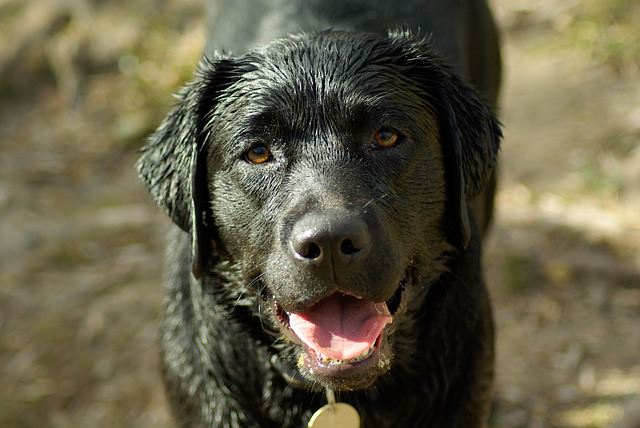Every dog lover knows the smell. If you blindfolded us and tested us, we could all pick out the smell of “wet dog”. It is a fairly distinctive scent, even for our noses which are really quite feeble among the noses of the animal world. So why do dogs stink when they are wet?
The answer lies partly in the way noses work. In a nutshell, mammalian olfaction (the ability to smell) is a complex interaction between scent molecules and receptors in the nose that can serve to pass the information to the brain of the smeller. It might seem a little gross, but the interface between the receptors and the air is a layer of mucous. 1

The scent molecules need to dissolve from the air into mucous layer before they can reach the surface of the receptors. Perhaps when your dog is wet, part of the work is already done. The wet “dog smell” molecules that are sensed by your olfactory receptors are more easily carried to your nose and then passed across the mucous layer to the binding sites that transmit the information to your brain when they have moisture to help.
We have considered the “wet” part of the question, but what about the stink itself? Even a clean, healthy dog has a scent. Scents are an important part of the animal world. Prey animals need to be able to recognize threats in any way that they can, and likewise, predator animals need to be able to track their prey by any means necessary to survive. Odors are normal. Even people have their own scent (and it does not have to be bad, although we all know that bad human odors do exist). Your dog could easily identify you by your individual scent, although humans are not quite as good at it. You and I can identify a wet dog by scent, but probably cannot tell if it is our dog specifically.

Other causes of odor on a wet (or any) dog can be because of environmental or health factors. Skin disorders can certainly smell foul and so can dogs that have rolled in garbage or carcasses. Fortunately, your nose should be able to tell what is normal “dog stink” and what indicates disease. Some causes of specifically bad smells on dogs can include ear infections, dental disease, and skin disease.
If you notice an odor to your dog that is different from his usual smell or one that persists even when he is clean, be sure to ask your vet to help you figure out why. Many of the possibilities for persistent foul dog odors are readily treatable, but very painful and should be treated promptly for the sake of your dog. In the end, we are kinda stuck with the smell of wet dog, but as long as it stays just the familiar “wet dog” smell, it is not cause for alarm.
Do you want to know more about dogs and other animals? Follow me on Facebook by clicking here.
1.Persaud KC. Engineering Aspects of Olfaction. In: Persaud KC, Marco S, Gutiérrez-Gálvez A, editors. Neuromorphic Olfaction. Boca Raton (FL): CRC Press/Taylor & Francis; 2013. Chapter 1. Available from: https://www.ncbi.nlm.nih.gov/books/NBK298822/
